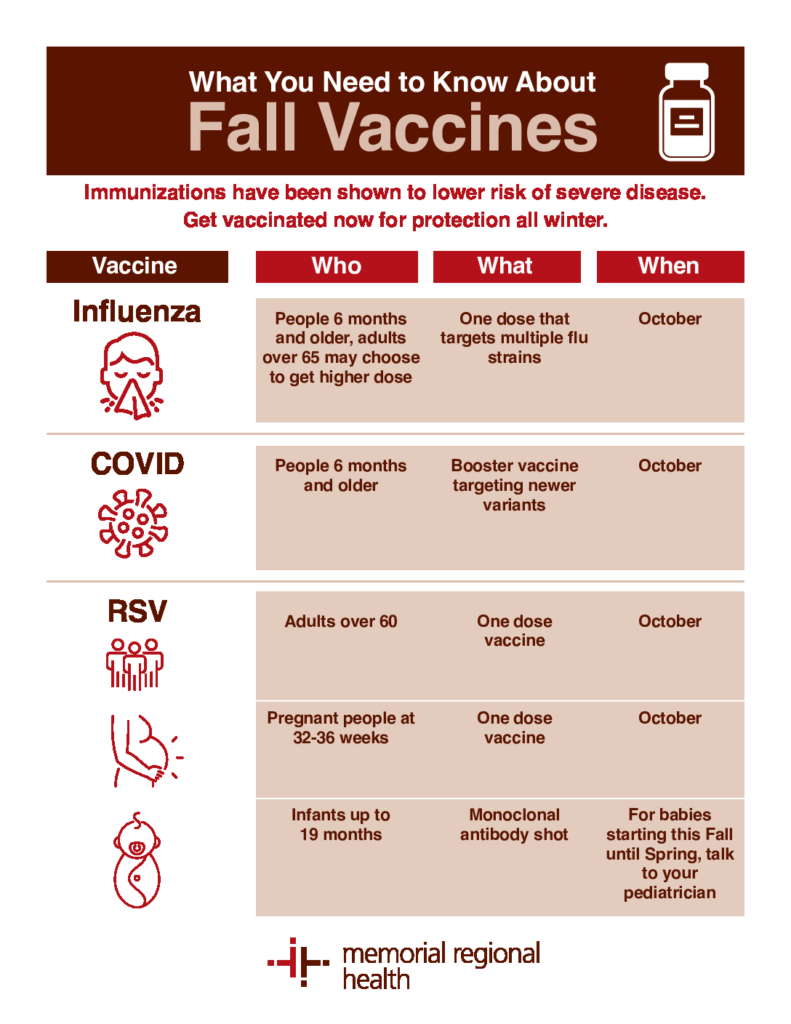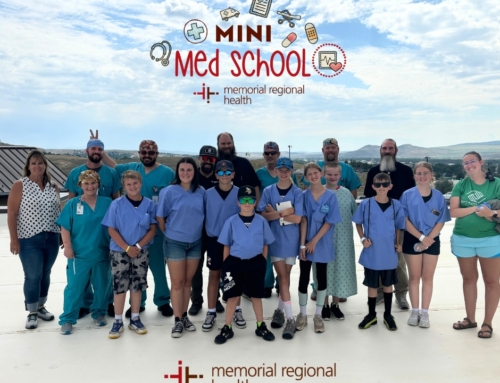Fall Vaccines 1, 2, 3: Who Should Get Which and When
Don’t miss any updates from Memorial Regional Health by signing up for our every-other-month Living Well newsletter here.
When the autumn leaves start to turn, it’s time to get our annual flu shot. For most of us, the flu can mean a week or two of feeling terrible—which is bad enough—but for some, especially young children and adults at risk of serious disease, the flu can be deadly.
But this year there are three vaccines to consider for your fall to-do list. Together, flu, RSV and COVID may again create a “tripledemic” if transmission rates rise as they’re expected to. Here’s the info you need to keep your family safe this respiratory-virus season.
Vaccine #1: Influenza
Every year a new version of the flu vaccine is made to target recently circulating variants. This year’s vaccine is comprised of two subtype A strains and two subtype B strains. What’s more, the benefits of your flu shot from last year don’t carry over to this year. You need a flu shot once a year.
This year for the first time, the CDC says that even those with egg allergies can get a flu shot because the amount of egg protein used in the vaccine is so small that the risk of a severe allergic reaction is virtually nil. Alternately, the MRH Community Pharmacy also carries the Flucelvax egg-free vaccine.

The CDC recommends that everyone 6 months and older get a flu shot. MRH pharmacists say October is the best month to get a flu shot, as this timing provides the best coverage through the peak of Craig’s flu season, which is typically in February. People 65 or older should get the higher-dose version. Flu shots are free with most insurance plans.
To get your flu shot at Memorial Regional Health, make an appointment with your primary-care provider by calling 970-826-2400 or visit the Community Pharmacy (walk-ins welcome) from 8:00 a.m. to 6:30 p.m. Monday through Friday.
Vaccine #2: RSV
This year the Food and Drug Administration has approved new vaccines to protect older adults against RSV, or respiratory syncytial virus. It’s a common respiratory virus that acts like a cold, but it can be serious in infants and older adults, each year leading to the hospitalization of tens of thousands of older Americans and the deaths of up to 10,000. RSV is the leading cause of hospitalization among kids under age 5.
Adults aged 60 and older and pregnant people should talk to their primary-care provider about whether the RSV vaccine is right for them. To make an appointment at MRH, call 970-826-2400.
In addition, infants up to 19 months old can receive a monoclonal antibody (nirsevimab, brand name Beyfortus) injection to protect them against RSV. This vaccine, recently approved by the FDA, may not be available until this winter. Discuss this vaccine with your baby’s primary-care provider. Guidelines for infants born of people who received the RSV vaccine during pregnancy are still forthcoming.
Vaccine #3: COVID Booster
Updated vaccines targeting COVID Omicron variant XBB.1.5. are now available, and the CDC is recommending that everyone 6 months old and older get one if it’s been at least two months since your last booster or three months since your most recent COVID infection. Those in the highest-risk groups, however, may want to get the new COVID booster right away, regardless.
The new COVID boosters will help protect you from serious acute illness over the coming winter season as well as long COVID. They’re available in Moderna and Pfizer formulations, and both companies say their boosters are also effective against the new BA.2.86 COVID variant.
At Memorial Regional Health, COVID boosters will soon be available at the Medical Clinic. To make an appointment, call 970-826-2400.
Can You Get Them All at Once?
The CDC says it’s OK to get the flu shot and COVID booster at the same time, in the same arm or different arms. Some providers may recommend spreading out the two shots, especially if you’ve had reactions in the past. Since the RSV vaccine is new, many experts are recommending getting it separately—say a week or two after your other shots.
Whether you get your shots in two or three visits, for Craig-area residents who would benefit from any of the vaccines, it’s best to get them on board in October to get the longest protection over the entire respiratory-virus season.
Call MRH at 970-826-2400 for more information.





